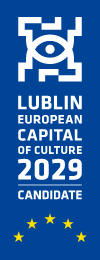
On June 14, Krakow will host the opening of an exhibition of artistic installations from the collection of the Open City festival, organized by the “Crossroads” Centre for Intercultural Creative Initiatives in Lublin. The exhibition will also include works by Krakow artists, complementing the author’s narrative and substantive context.
The artworks presented are united by a common idiom, which, written in graphic variation, reflects its ambiguity and depth of content. The main theme is “Mater: I”, reflects the dualism between matter (body) and spirituality (self). The location of the exhibition – the area of the former hospital – symbolically associated with the beginning of life, emphasizes the creative process as an analogy of birth, in which the artist (mater) creates a work of art (me), later capable of independent functioning. In this context, we refer to Tadeusz Kantor’s concept of the “total artist”. Kantor wrote about the need to “abandon” one’s works so that they can be independent. In our exhibition, we refer to the trend of new materialism, which questions the fundamental assumptions of (still popular) humanism, which treats man as the centre of the universe and a superior entity over other forms of existence. New materialism turns everything upside down, urging us to see objects as their own subjectivity and “hidden life.”
The space of Wesoła, formerly associated with a hospital, evokes both the physical and spiritual aspects of human existence. The human body, treated as an object of research, for instance at “the Theatrum anatomicum” was reduced to a system of organs. On the other hand, what defines a human being transcends physical boundaries. Our existence, spirituality, and personality move the matter of the body, shape our identity, and defining who and what we are, and what we believe in. The exhibition encourages reflection on interpersonal relationships, values, and faith, especially in the context of bodily suffering. The main theme contains “it matters”, which additionally emphasizes what is important.
The Open City Festival aims to make contemporary art an integral part of urban life, allowing it to amaze, inspire, and leave lasting traces. We want the city and its districts to be open to new ideas, and reinterpretations of old concepts. We see art as key to understanding history, social, political, and cultural context, influencing the way we perceive the world around us.
The Open City reveals what is hidden, changing the traditional rules of public communication. By intervening in urban space, we transform way it is perceived, opening the door to discovering new meanings and contexts.
Piotr Franaszek
The exhibition will take place in the former University Hospital at Mikołaja Kopernika Street in Krakow.
